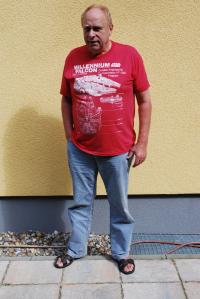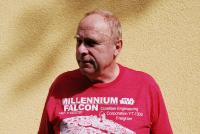Of course we knew what it meant to not be able to go away from there anymore

Stáhnout obrázek
Manfred Matthies was born in 1941 in Magdeburg. He grew up in a bomb-wrecked city which he perceived as a giant playground with no boundaries at the time. His father had died shortly after the end of the war and his mother had to raise Manfred and his two siblings on her own. Manfred passed an apprenticeship as a shipbuilder. In the early days of the GDR, he didn’t become politically engaged. However, he did put up some opposition when he had to take part in the cultural activities of the Youth Union. Despite his acts of resistance, he hadn’t registered any difficulties. In 1959, Manfred – at the age of 18 – fled with his mother and sister from Magdeburg via East Berlin to West Berlin. It was only later when he learned that his mother had already been under the surveillance of the Stasi because of her contacts to the West. From West Berlin the family was sent to North Rhine- Westphalia, where Manfred subsequently worked for several years. At this time, he was also able to make his dreams come true and travel Europe. In 1961, he left West Germany and went to study in West Berlin, where his older brother had already been studying for some time. There he witnessed also the construction of the Berlin Wall. In the ensuing period, a large part of the West-Berlin population privately began to assist fugitives from the East, as most families had personal contacts with the people of East Berlin. Manfred and his brother were no exception to this and they became engaged in this sort of activities, becoming members of a student group supporting and assisting East-German fugitives. Manfred gradually tried the complete repertoire of escape-assistance methods: forging passports, tunnel excavations, fleeing through the sewers, border crossings in specially modified cars, getaways in a car across the Hungarian-Austrian or Yugoslav border. He even took fugitives in a sailboat from Poland to the FRG via the Baltic Sea. At the end of December 1972, however, he was arrested at a border checkpoint when he tried to smuggle in some fugitives in a converted car to West Berlin. For 9 months, he was held in custody in Berlin-Hohenschönhausen and was eventually sentenced to 13 years in prison. He served a part of his term in the Bautzen II prison. The period of his incarceration was characterized by forced labor, a lack of privacy, forced communion with the other inmates and the constant hope of an amnesty. After three years, in March 1976, Manfred was released from prison after an intervention by the West-German government. He went back to West Berlin, where he married for a second time and had two daughters. He was no longer suitable for helping the fugitives from the East, as he was no more a stranger to the Stasi agents. The collapse of the Wall in 1989 came as a complete surprise to Manfred. The night the Wall came down, Manfred was with some of his friends at the Brandenburg Gate. After Christmas 1989, he travelled for the first time since the 1970s to East Berlin, where the sight of the decaying old quarter came as a shock to him. Today, Manfred works as an employee of the Bautzen Memorial. He feels obliged to pass on his experiences to the younger generations in order to preserve the memories of his generation.


